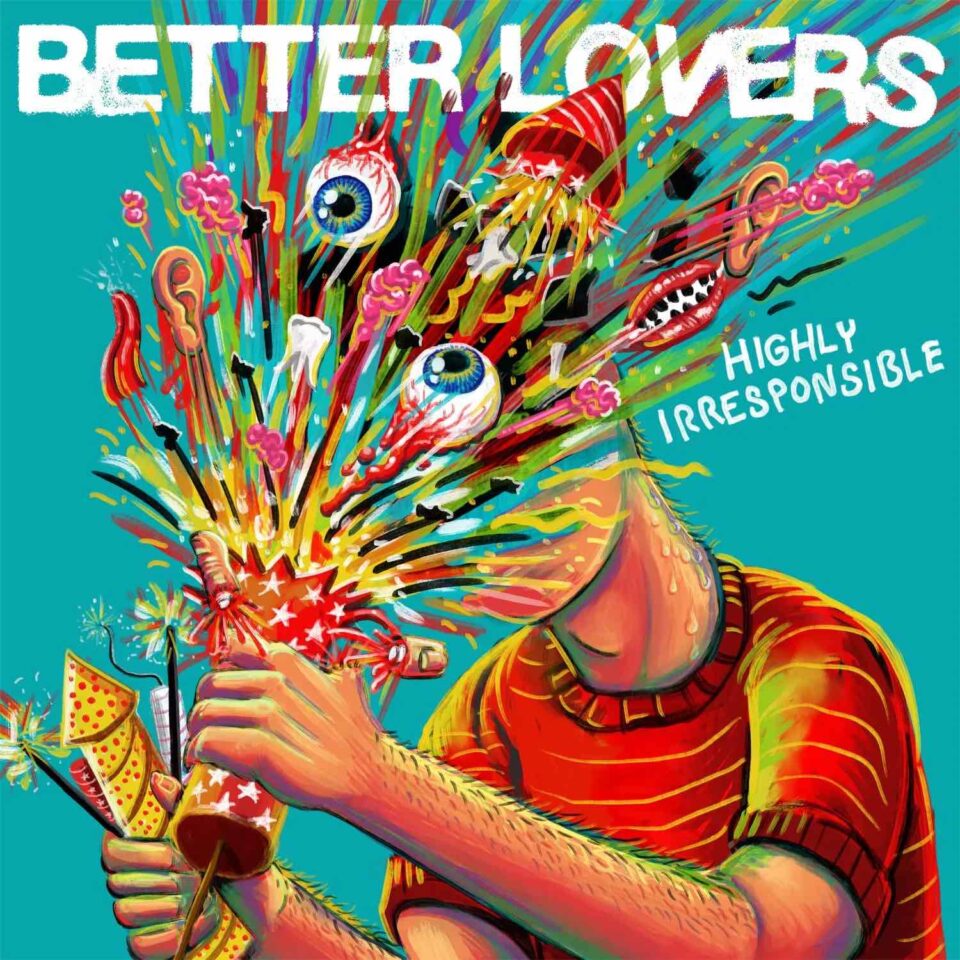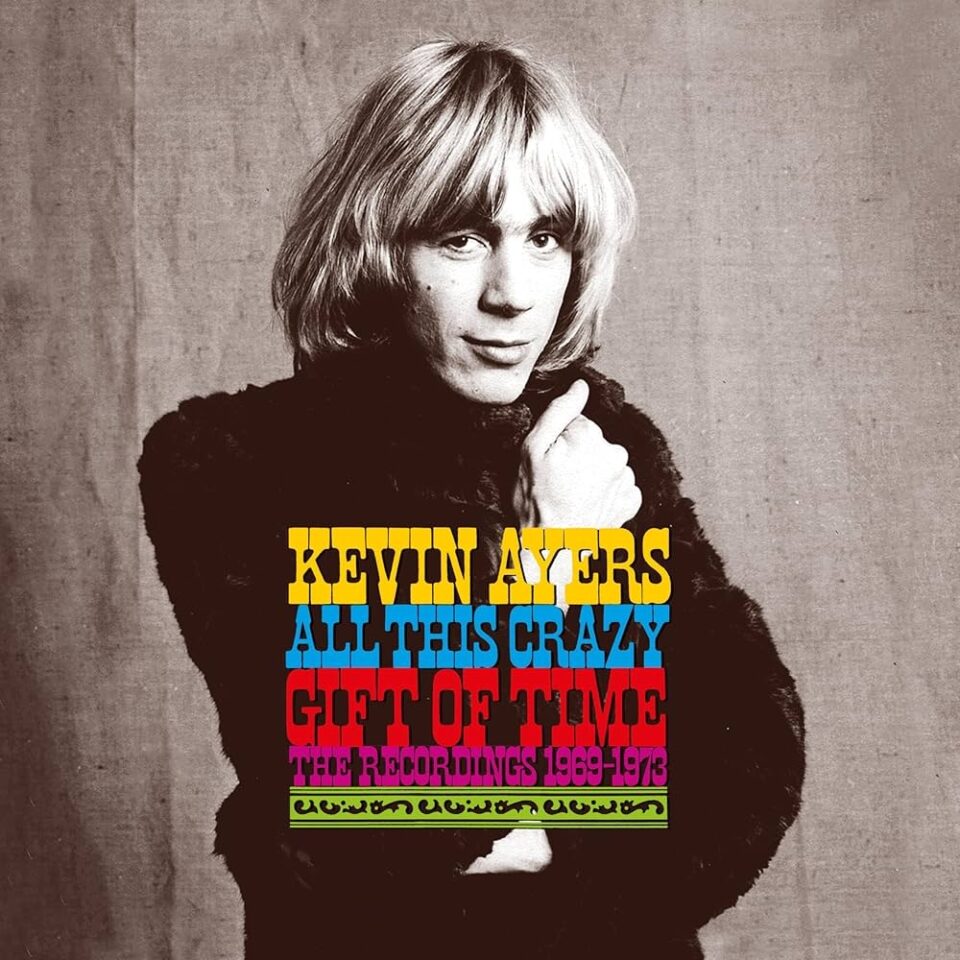Even though the members of MGMT now live on opposite sides of the US—Ben Goldwasser in LA, Andrew VanWyngarden in “the woods near New York City”—their enduring connection becomes clear as soon as they both appear for a recent Zoom video chat. They banter easily with each other, frequently joking and laughing. But tight as their bond may be, it doesn’t always mean that their musical collaborations are equally effortless. When it comes to the duo’s inventive psych-pop, they admit that it can sometimes take a fair amount of finagling before they agree on where they should take their sound next.
Fortunately, they’ve persevered, and this dynamic push-and-pull has resulted in five unique studio albums so far—including this most recent endeavor, Loss of Life. “The songs that make it to an MGMT album, they’re the only things that Ben and I both feel the same way about,” VanWyngarden says. “There’s not many things that make it through that threshold in the end. It’s really just about what we both are feeling and believing in at that moment, more than any sort of stylistic intention.”
Their divergent viewpoints stem from the fact that, as Goldwasser explains, “We have pretty different tastes, musically” (with a grin, VanWyngarden teases Goldwasser: “Ben is a big Swiftie!”). “There’s never a sure thing,” Goldwasser continues, unruffled. “When we get together to make music, we’re not immediately on the same wavelength, so it’s a process of figuring that out.”
After a few rounds of experimenting, they’ll finally start to see ways to reconcile their clashing opinions. “Thankfully, somehow, at some point in the creative process we hit something where we’re both like, ‘Oh, yeah!’—and then it turns on the MGMT circuitry,” VanWyngarden says. Once that happens, they say, the material will come together quickly.
MGMT’s last album, Little Dark Age, came out in 2018. Given that those intervening years have resulted in remarkably tumultuous times in the world, it’s perhaps something of a surprise to find the band going for a distinctly uplifting vibe with these new songs. “It feels more optimistic, in a way—more than we’ve ever felt putting out a record,” Goldwasser says. “I think we had such a good time making it that it still feels fresh to us, and I think we also just have a general good feeling about how it’s going to be received. I don’t want to jinx anything, but it feels like already people who’ve heard it are connecting with it.”
“Loss of Life feels more optimistic, in a way—more than we’ve ever felt putting out a record.” — Ben Goldwasser
Even Loss of Life’s ominous title, VanWyngarden says, reflects this determination to look on the bright side. “In the very beginning, we usually come up with lots of joke album titles,” he says. “This time, we were like, ‘Let’s call it Loss of Life, and it’ll be MGMT’s last album!’ But then when we started making songs and it was coming together, we started to see ‘loss of life’ as having multiple meanings. We started converting what seems like a negative-sounding title into lots of positive feelings.” This, in contrast with the “dark or morbid humor that entered into [Little Dark Age]—that sort of felt like a necessary response, or a coping mechanism, with how terrifying and absurd the world was getting at that moment. And the world isn’t any less terrifying or absurd now, but something’s happened where I think we’re trying to do something that’s connecting with people on an emotional level that’s more direct and sincere.”
There was also a certain exhilaration ingrained into this album because they didn’t have a major record label looming over the process. “For the first time since 2006, we were making music while not on a label,” Goldwasser says. “That meant that there weren’t these considerations of, ‘Will it make it past the label’s quality control?’”
“It just felt different than before, where there was always this sort of stress that I think would bring on creative blocks. This time, we were just going with the flow more,” VanWyngarden says.

“I feel like MGMT is sort of like Birkenstocks, in a way. Like, we go through different phases of being cool or being really dorky, but we’re really reliable and we’re made of good quality materials.” — Andrew VanWyngarden
“We don’t necessarily care about being cool at all, at this point—which is a very liberating feeling,” Goldwasser says. “Especially being our age, still in a band after 20 years. I think it would be easy to fall into this trap of being like, ‘Oh, how do we make the kids think we’re still cool?’ We put that out of our heads and are just like, ‘Maybe we’re making incredibly dorky music or something like that, but hopefully somebody will like it because we like it.’”
That comment triggers another grin from VanWyngarden. “I was thinking the other day that I feel like MGMT is sort of like Birkenstocks, in a way,” he says, eliciting a laugh out of Goldwasser. “Like, we go through different phases of being cool or being really dorky, but we’re really reliable and we’re made of good quality materials.”
Both VanWyngarden and Goldwasser had shown a natural talent for music at an early age, but they had very different attitudes about the prospect of actually becoming professional musicians. For his part, VanWyngarden was always all-in: “I knew I loved music. I always thought if I was going to be a musician, I would be a drummer or a bass player in a really fun band. That was my dream,” he says. He started joining bands while still attending high school in his hometown of Memphis.
Growing up in Upstate New York, Goldwasser was initially much more cautious about this type of plan. “My grandfather on my mom’s side was a music professor at a university, and he told me, ‘If you really love music, don’t do it for your job,’” he says. “I think that kind of stuck with me from a pretty young age, so I was always trying to figure out anything else other than music to do for a living so that I could keep enjoying music. But then music was just the thing that stuck; I’d keep coming back to it.”
They both ended up enrolling at Wesleyan University in Connecticut, where they lived in the same dormitory. “When we first met, I was listening to a lot of questionable music, but Ben introduced me to so much great stuff,” VanWyngarden says. “A lot of that was my first real introduction to electronic music.” He recalls they particularly bonded over their shared love for Aphex Twin.
Someone in the dorm had a Hammond organ, and Goldwasser and VanWyngarden got permission to poke around on it. They’d never sat down together like this before, and VanWyngarden says it was immediately clear that something special was happening. “[It was] a three-hour jam, and we were doing all this crazy stuff. I was like, ‘Wow, what is going on? How can we make something this fun and satisfying out of just one instrument?’ We just had this connection right away.”
“We don’t necessarily care about being cool at all, at this point—which is a very liberating feeling. Especially being our age, still in a band after 20 years.” — Ben Goldwasser

They decided to turn their impromptu duo into a real band, but soon found that their wide-ranging musical tastes and sonic adventurousness were subject to severe limitations. “When we started out, we were not skilled at all at recording,” Goldwasser says, “and we also didn’t have a recording studio; we were just doing stuff on our school laptops, [which] in 2001 couldn’t really do a lot.” This turned out to be a blessing in disguise, though, as it helped MGMT come up with an utterly unique style that VanWyngarden describes as being “like Aphex Twin combined with Talking Heads and ’80s pop music.”
They released a pair of EPs via indie label Cantora in 2004 and 2005, then shifted to Columbia Records for their 2008 debut full-length, Oracular Spectacular. The band was immediately lauded for their ability to create hook-heavy, deliriously trippy songs that were at once nostalgic and futuristic. “When I think of the lyrics to ‘Kids’—one of the first songs we made where it had lyrics—I think that that was really inspired by the sort of nostalgic, slightly vague but emotionally present lyrics that David Byrne can do,” VanWyngarden says. “I grew up listening to Talking Heads all the time, my parents were huge fans. I’m sure that seeped in, along with other classic bands: Bob Dylan and Tom Petty and Fleetwood Mac and all these things.”
As Goldwasser points out, this early material continues to resonate with listeners even now—“Time to Pretend” is currently having a viral moment on TikTok as new fans discover it, likely due to its inclusion on the soundtrack for the 2023 hit film Saltburn. “It’s a song we wrote when we were at Wesleyan about this ironic rock star life—kind of a silly fantasy thing. Now it’s retro. Now it’s like us listening to Hall & Oates in college. Which is also blowing my mind, the fact that this is a 20-year-old song that young people are liking in a way that’s retro.”
They have some theories about why their music has cross-generational appeal. “We happened to have made some songs that are quite catchy and became popular without us intending to do that,” Goldwasser says. “I think there’s definitely something universal about some of those songs. But then I think we have a fan base that’s stuck with us doing some very uncommercial things, and who feel like that’s the best thing about us: that we don’t just keep doing the thing that was successful.”
“It’s blowing my mind, the fact that ‘Time to Pretend’ is a 20-year-old song that young people are liking in a way that’s retro.” — Ben Goldwasser
MGMT’s history confirms this attitude: instead of rushing to repeat the same formula that had earned them such acclaim with Oracular Spectacular, they’ve taken their time between each of their ensuing albums. “We always felt like a turtle that’s slow and steady, going along doing our thing. There’s a lot of people out there who connect with that and want to join us,” VanWyngarden says. Of course, they hope that connection will continue as their fans check out Loss of Life. When they hear it for the first time, VanWyngarden says, “I would love it if people were laughing and crying at the same time. Kind of like how you do when you’re on mushrooms or something.”
Goldwasser smiles at that, but grows serious as he adds to the sentiment: “There’s something, to us, that feels kind of raw and personal about the music, so I think we just hope that it’s met with a response of people really trying to get into it and to get where it’s coming from.”
And where it’s coming from, it turns out, is one of those things about which both members of MGMT can agree: “A method to prevent yourself from feeling hopeless or super cynical is to remember that there’s this sort of universal energy, which we both feel like is around love and connection, that is indestructible,” VanWyngarden says. He pauses for a second, then adds, “See, the thing is, when you start talking about it, you start sounding like you’re a Christian or something, and neither of us is a practicing religious person. But we both feel this urge to get this message across—and we want people to feel a reassurance and a connection from that.” FL









